The river is free
In the stillness of evening/ Ravi is humming a melodious tune/ Don8217;t ask me what is the state of my mind/ I am standing on the bank of ...

In the stillness of evening/ Ravi is humming a melodious tune/ Don8217;t ask me what is the state of my mind/ I am standing on the bank of the gurgling waters/ I am not aware of where I am standing8217;. Thus spake the poet Iqbal, about the mesmeric beauty of the Ravi while standing on its banks in Lahore.
I had occasion to revive memories of my childhood, spent on the banks of the Ravi in Sarai Sidhu, a non-descript town in central Punjab of pre-Partition days. The occasion was my visit to Chamba, a town nestled in the valley of Himachal Pradesh. At Chamba, Ravi enters the plains.
About three miles from Sarai Dishu, there was an ancient Ram temple on the banks of the Ravi. Legend has it that Sri Ram and Lakshman visited that place swimming in the Ravi in search of Sita. When tired, Sri Ram came out of the river on the left bank and Lakshman on the right. The site of Ram8217;s sojourn came to be known as Ram Chabutra platform and that of Lakshman as Lakshman Chabutra. Ram Chabutra became the place of pilgrimage for devotees from all over Punjab, particularly during the Baisakhi festival that heralds the onset of summer and wheat harvesting. The Ravi was frequently flooded, particularly during the rains. Boats were the only means of transportation across the expanse of the river. There was a very strong belief that girls marrying across the river will be lost forever. This was summed up in a Punjabi saying: 8216;Jaa nee dheeye Ravi/ Na koi avi, na koi javi8217; Go my daughter across Ravi/ You will never come back/ Nor anybody will visit you.
I also remembered my school days, when a group of students, including my self, dared to visit the Ravi during school hours. The reason for this flagrant violation of rules was the approaching annual examination, when we used to replenish our stock of pens and pencils. In those days, Urdu was the medium of instruction and was written with an improvised pen kalam made of reeds, a wild-growing grass, abundantly available in the marshy river bed. Next day, we were hauled up by the teacher, whose style of punishing students was distinctive. While teaching, he would walk through the rows of benches. When he would approach a truant boy, he would slap him without blinking an eyelid and without interrupting his teaching.
While enjoying the gushing waters at Chamba, I ruminated that this water was flowing towards my birthplace without any let or hindrance. I, the so-called son of the soil, dare not enter it without a document signed by a member of a faceless bureaucracy. I wondered how much the 8216;8216;civilised8217;8217; humans have entangled themselves in cobwebs of their own making! How they have fettered their freedom by rules and regulations. How much bloodshed goes on to guard the artificial frontiers that divide countries.
- 01
- 02
- 03
- 04
- 05































